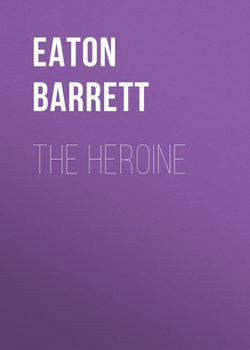Читать книгу The Heroine - Barrett Eaton Stannard - Страница 5
LETTER II
ОглавлениеIt was not till this morning, that a thought of the most interesting nature flashed across my mind. Pondering on the cruel conduct of my reputed father, in having burnt my novels, and discharged you, without even allowing us to take a hysterical farewell, I was struck with the sudden notion that the man is not my father at all. In short, I began with wishing this the case, and have ended with believing it. My reasons are irresistible, and deduced from strong and stubborn facts. For, first, there is no likeness between this Wilkinson and me. 'Tis true, he has blue eyes, like myself, but has he my pouting lip and dimple? He has the flaxen hair, but can he execute the rosy smile? Next, is it possible, that I, who was born a heroine, and who must therefore have sprung from an idle and illustrious family, should be the daughter of a farmer, a thrifty, substantial, honest farmer? The thing is absurd on the face of it, and never will I tamely submit to such an indignity.
Full of this idea, I dressed myself in haste, resolving to question Wilkinson, to pierce into his inmost soul, to speak daggers to him; and if he should not unfold the mystery of my birth, to fly from his house for ever. With a palpitating heart, I descended the stairs, rushed into the breakfast-room, and in a moment was at the feet of my persecutor. My hands were folded across my bosom, and my blue eyes raised to his face.
'Heyday, Cherry,' said he, laughing, 'this is a new flourish. There, child, now fancy yourself stabbed, and come to breakfast.'
'Hear me,' cried I.
'Why,' said he, 'you keep your countenance as stiff and steady as the face on our rapper.'
'A countenance,' cried I, 'is worth keeping, when the features are a proof of the descent, and vindicate the noble birth from the baseness of the adoption.'
'Come, come,' said he, 'your cup is full all this time.'
'And so is my heart,' cried I, pressing it expressively.
'What is the meaning of this mummery?' said he.
'Hear me, Wilkinson,' cried I, rising with dignified tranquillity. 'Candor is at once the most amiable and the most difficult of virtues; and there is more magnanimity in confessing an error, than in never committing one.'
'Confound your written sentences,' cried he, 'can't you come to the point?'
'Then, Sir,' said I, 'to be plain and explicit, learn, that I have discovered a mystery in my birth, and that you – you, Wilkinson, are not – my real Father!'
I pronounced these words with a measured emphasis, and one of my ineffable looks. Wilkinson coloured like scarlet and stared steadily in my face.
'Would you scandalize the mother that bore you?' cried he, fiercely.
'No, Wilkinson,' answered I, 'but you would, by calling yourself my father.'
'And if I am not,' said he, 'what the mischief must you be?'
'An illustrious heiress,' cried I, 'snatched from my parents in her infancy; – snatched by thee, vile agent of the diabolical conspiracy!'
He looked aghast.
'Tell me then,' continued I, 'miserable man, tell me where my dear, my distracted father lingers out the remnant of his wretched days? My mother too – or say, am I indeed an orphan?'
Still he remained mute, and gazed on me with a searching intensity. I raised my voice:
'Expiate thy dire offences, restore an outcast to her birthright, make atonement, or tremble at retribution!'
I thought the farmer would have sunk into the ground.
'Nay,' continued I, lowering my voice, 'think not I thirst for vengeance. I myself will intercede for thee, and stay the sword of Justice. Poor wretch! I want not thy blood.'
The culprit had now reached the climax of agony, and writhed through every limb and feature.
'What!' cried I, 'can nothing move thee to confess thy crimes? Then hear me. Ere Aurora with rosy fingers shall unbar the eastern gate – '
'My child, my child, my dear darling daughter!' exclaimed this accomplished crocodile, bursting into tears, and snatching me to his bosom, 'what have they done to you? What phantom, what horrid disorder is distracting my treasure?'
'Unhand me, guileful adulator,' cried I, 'and try thy powers of tragedy elsewhere, for —I know thee!' I spoke, and extricated myself from his embrace.
'Dreadful, dreadful!' muttered he. 'Her sweet senses are lost.' Then turning to me: 'My love, my life, do not speak thus to your poor old father.'
'Father!' exclaimed I, accomplishing with much accuracy that hysterical laugh, which (gratefully let me own) I owe to your instruction; 'Father!'
The fat farmer covered his face with his hands, and rushed out of the room.
I relate the several conversations, in a dramatic manner, and word for word, as well as I can recollect them, since I remark that all heroines do the same. Indeed I cannot enough admire the fortitude of these charming creatures, who, while they are in momentary expectation of losing their lives, or their honours, or both, sit down with the utmost unconcern, and indite the wittiest letters in the world. They have even sufficient presence of mind to copy the vulgar dialect, uncooth phraseology, and bad grammar, of the villains whom they dread; and all this in the neatest and liveliest style imaginable.
Adieu.
